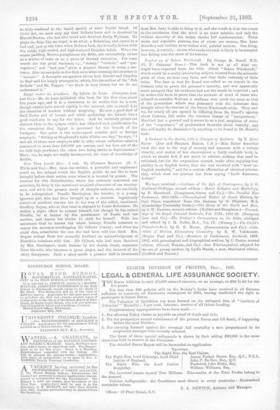CURRENT LITERATURE.
Owlet Ash. By Monica. (Marcus Ward and Co.)—Monica is the youngest of that bright sisterhood whose austere leaders are known to the brutal Philistine as Ouida, Rhoda Broughton, and Helen Mather& In the ardour of youthful worship, she has sucked inspira- tion from the glowing spirit of these writers, and yet we are perfectly ready to hear that she has never read a novel in her life. This does not affect the matter at all. It is all the effect of Zeit- geist, which in things mental corresponds to the sporadic-germ theory in things medical. Hones, the startling similarities which load the ineantioua critic to suggest imitation, whereas a broader view would teach him that these ladies, in their writings, do but work out the biddings of a mysterious power with a fondness for three-volume publications. The mere quotation of the heroine's name, Dolores Streatham, tells us a groat deal. Dolores ! It speaks volumes, and unfortunately, in a language bearing a deceptive resemblance to English, though the reader is not stingily restricted to one language, as the linguistic wealth of Monica includes French, Italian, and a kind of Latin, which produces such forms as "secandos " and such con- structions as "pro temporis." A critical convention condemns this opulence of diction, and yet is it not absurd to suppose that writers of great depth will finch a single vocabulary enough to give adequate expression to their ideas P Have not all languages their limitations, and is not a writer justified in using net three, but thirty tongues, if needful ? Let Monica next time write a polyglot novel, for we feel sure there are certain nuances of gastronomic taste which are only to be truly rendered in the liquid speech of some Pacific island. Of Owlet Ash, we need only say that Dolores loves and is deceived by Harold Burton, who has also loved and deceived Emily Wybrant. He plays the flute like an angel, is an artist, a Bohemian, and comes to a bad end, just at the time when Dolores finds she is really in love with the noble, high-souled, and high-statured Croydon Adair. When she wants padding, Monica paraphrases the Bible, not successfully, either as a matter of taste or as a piece of literary execution. For some words she has great fondness, e.g., "dainty," "certain," and " pre- rogative ;" and "look you" gives a piquant flavour to many a sen- tence. Also we are quite in the dark as to what meaning she attaches to "laconic." A favourite comparison likens both Herold and Croydon to Saul and his kingly prerogative, which, like the author of the" Bab Ballads" and Mr. Tupper, "we kiwi,/ is very clever, but we du not understand it."































 Previous page
Previous page